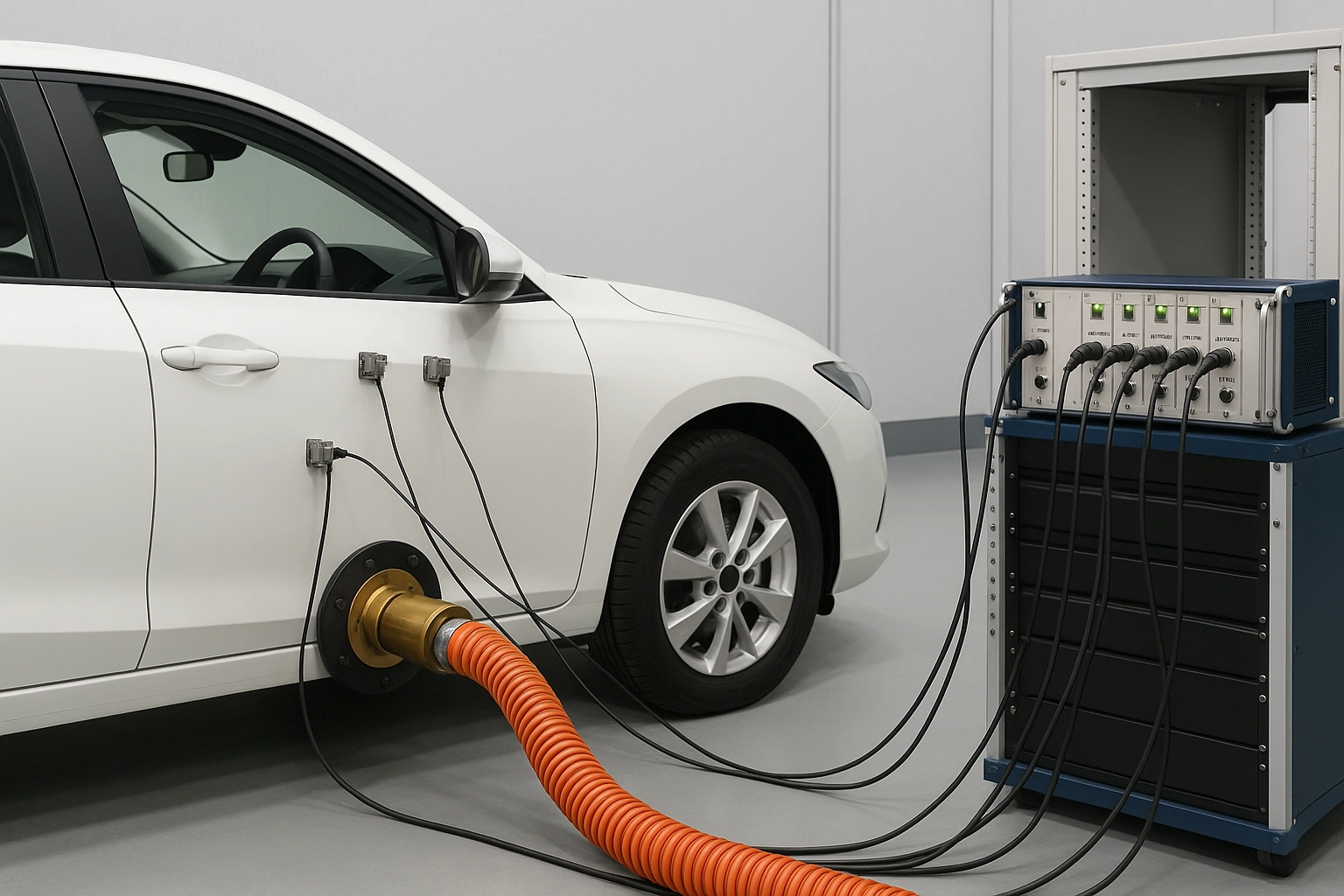FMVSS 203 Steering Column NVH Durability Testing
The Federal Motor Vehicle Safety Standard (FMVSS) 203 requires manufacturers to ensure that steering columns in vehicles are designed with adequate noise, vibration, and harshness (NVH) characteristics. This standard aims to enhance the overall driving experience by reducing discomfort caused by excessive NVH, which can significantly impact a vehicle’s marketability.
Our FMVSS 203 Steering Column NVH Durability Testing service ensures compliance with this critical safety and comfort standard. The testing focuses on the durability of steering columns under various conditions that simulate real-world driving scenarios. This includes high-frequency vibrations, low-frequency impacts, and sustained operational stress.
The testing process is designed to replicate the dynamic forces a vehicle’s steering column encounters during typical usage, such as sharp turns, pothole navigation, and heavy acceleration or braking. By subjecting the steering column to these stresses in controlled laboratory conditions, we can identify any potential weaknesses that might lead to NVH issues or safety hazards.
One of the key aspects of this testing is the use of sophisticated instrumentation that measures various parameters including frequency response, amplitude, and phase shift. These measurements are crucial for determining whether the steering column meets the specified limits set forth in FMVSS 203. The test results provide detailed insights into the NVH performance of the steering column, helping manufacturers refine their designs to meet both regulatory requirements and consumer expectations.
The testing process is not only about compliance but also about optimizing vehicle performance. By identifying areas where improvements can be made, our service helps automotive companies enhance the driving experience for consumers while ensuring safety standards are met. This comprehensive approach ensures that every component of a vehicle, including its steering column, contributes to an overall superior product.
- High-frequency vibration tests simulate rapid changes in speed or direction experienced during sharp turns and sudden acceleration.
- Low-frequency impact tests mimic the effects of driving over uneven road surfaces like potholes or rough terrain.
Why It Matters
The NVH performance of a vehicle’s steering column is crucial for both safety and comfort. Poor NVH can lead to increased driver fatigue, reduced maneuverability in adverse conditions, and even potential structural failures over time. Compliance with FMVSS 203 not only ensures that vehicles meet regulatory requirements but also enhances the overall driving experience.
Driver comfort is a significant factor in customer satisfaction and retention. NVH issues can make driving less enjoyable, leading to dissatisfied customers and potentially affecting brand reputation. By addressing these issues through rigorous testing, manufacturers can improve both the safety and comfort of their vehicles, contributing positively to market competitiveness.
In addition to consumer satisfaction, compliance with FMVSS 203 is essential for automotive companies to avoid costly recalls and potential legal challenges. Non-compliance can result in fines and damage to brand reputation, which can have long-term financial implications. Our testing service helps manufacturers navigate these complexities by providing reliable data that supports regulatory compliance.
Our service also plays a vital role in the research and development (R&D) process. By identifying potential issues early in the design phase, automotive companies can make necessary adjustments to their steering column designs. This proactive approach ensures that any NVH concerns are addressed before production begins, reducing costs associated with post-manufacturing modifications.
Moreover, our testing service supports the procurement process by providing detailed reports on supplier performance. Suppliers who consistently meet or exceed FMVSS 203 requirements can be identified and prioritized for future projects, enhancing supply chain efficiency and quality control.
Scope and Methodology
The scope of our FMVSS 203 Steering Column NVH Durability Testing service is comprehensive, covering all aspects of the steering column’s performance under specified conditions. The methodology involves a series of tests designed to evaluate the structural integrity and NVH characteristics of the steering column.
Firstly, we conduct high-frequency vibration tests using specialized equipment that simulates rapid changes in speed or direction. This helps us assess how well the steering column can handle quick maneuvers without compromising performance or causing discomfort. Secondly, low-frequency impact tests are performed to mimic driving over uneven road surfaces like potholes or rough terrain. These tests evaluate the resilience of the steering column against impacts and shocks.
The testing process also includes durability tests that simulate sustained operational conditions typical in real-world driving scenarios. This ensures that the steering column can withstand prolonged use without exhibiting any signs of wear or failure. Throughout the testing process, we utilize state-of-the-art instrumentation to measure various parameters such as frequency response, amplitude, and phase shift.
Once the tests are completed, detailed reports are generated providing comprehensive data on the NVH performance of the steering column. These reports serve as valuable resources for manufacturers in refining their designs and ensuring compliance with FMVSS 203. The results also help identify areas where improvements can be made to enhance both safety and comfort.
In addition to our testing capabilities, we offer support in specimen preparation and instrumentation calibration. This ensures that all components tested are representative of the final product and that the instruments used for measurement are accurate and reliable. Our team of experts works closely with clients throughout the testing process to ensure that every aspect is addressed thoroughly.
Frequently Asked Questions
Customer Impact and Satisfaction
- Enhanced driving experience: By identifying NVH issues early, our service ensures that vehicles meet high standards of comfort and safety.
- Increased customer satisfaction: Our testing helps manufacturers deliver products that exceed consumer expectations, leading to higher levels of customer satisfaction.
- Improved brand reputation: Compliance with FMVSS 203 is essential for maintaining a positive brand image. Our service supports this by providing reliable data that ensures regulatory compliance.





